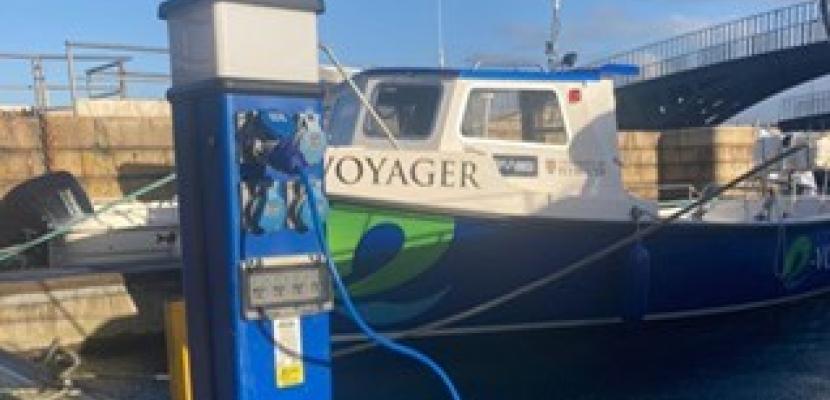
Plymouth, conversion local ferries to electric propulsion, installation of waterside charge points

About this good practice
Plymouth Boat Trips and Mount Batten Ferry applied for funding offered by the University of Plymouth in order to convert two diesel-powered vessels to electric power (lithium-ion battery).
The e-Voyager and M.V. Copper ferries (both 12 passengers) are the first electric powered sea-going vessels in the UK and can operate for a normal day on a single charge and recharge fully, overnight.
Plymouth Boat Trips now plan to convert another, larger boat to electric power and to design and build the first purpose built electric vessel of its type in the UK.
Plymouth City Council facilitated this project by identifying the funding the operators could apply for and by providing 3 quayside electric charging points (including 2 x 22kW chargepoints and 1 x 3 phase commando socket) installed by SWARCO at the Barbican landing stage to enable the ferries to operate once converted. The project was also supported by the Marine Business Technology Centre and other partners.
This project addresses the need for carbon emissions reductions in the maritime sector, local air quality improvements and an improved experience for passengers (electric ferries are quieter and do not generate unpleasant diesel fuel emissions). Additional charge points are planned to support local boat owners in their ambitions to decarbonise.
The main beneficiaries and stakeholders are ferry passengers, ferry operators, local boat owners and Plymouth City Council.
Expert opinion
Decarbonising the maritime sector is a major challenge due to its reliance on conventional fossil fuels, and its specific requirements related to operating vehicles with long journey times and high fuel consumption. Existing solutions therefore still pose significant technical challenges. The economic case can also be a challenge, with high upfront costs of the transition both for vehicles and for charging and refuelling infrastructure. This is an interesting practice for demonstrating the possibilities, with grants issued under the ERDF for two small passenger vehicles (and plans for one larger one), capable of operating for a full day on a single charge. The case can provide a demonstration of new technologies, as well as reducing carbon emissions and improving air quality, in an industry which will need to significantly ramp up its decarbonisation efforts in the next years.
Resources needed
£50k from the UK DfT’s Transforming Cities Fund funded the initial chargers, sockets and additional waterside charge points. The £90k costs of the electric motors, batteries and refit of vessels was funded by the operators (£36k) and ERDF funding (£54k) via the University of Plymouth's Impact Lab.
Evidence of success
Success is evidenced by the fact that the Mount Batten Ferry now has an operational electric ferry providing a significant proportion of its 18,500 annual crossings and 200,000 annual passenger movements, and that Plymouth Boat Trips have a vessel they use to supplement their existing routes and which is the UK’s first sea-going electric ferry. The latter is being used as a prototype for a larger purpose built ferry that PBT are having built to operate on the Cremyll Ferry route.
Potential for learning or transfer
This practice could be interesting for other regions because there is going to be increased pressure for the maritime sector to meet climate emissions targets. This project has involved some of the first foot passenger ferries operating in coastal waters being converted to electrical propulsion and success is demonstrated by the fact that Plymouth now has two electric powered ferries operating in its coastal waters.
